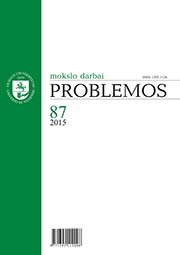LAIKINĖS SĄMONĖS INTENCIONALUMAS LEVINO IR WALDENFELSO FENOMENOLOGIJOJE
INTENTIONALITY OF TEMPORAL CONSCIOUSNESS IN LEVINAS’S AND WALDENFELS’S PHENOMENOLOGY
Author(s): Vijolė ValinskaitėSubject(s): Philosophy
Published by: Vilniaus Universiteto Leidykla
Keywords: phenomenology; intentionality; temporality; alterity; Levinas; Waldenfels
Summary/Abstract: The paper analyses the problem of intentionality in Levinas’s and Waldenfels’s phenomenology. By offering the critiques of intentionality and living present, Levinas traces the problem of Husserl’s phenomenology which raises when he solves the problem of the giveness of the other. Levinas believes that the giveness of the other already as the meaning determines the being of the consciousness as closed, self-sufficient structure which conditions the impossibility of appearance of alterity. By seeking to ground the possibility of the alterity’s appearance, Levinas defines consciousness not by intentionality but unintentionality. Precisely the description of consciousness by unintentionality uncloses an approach to radical alterity, which, on the one hand, lets to define consciousness itself as un-synthesized rupture, and on the other hand, brings us back to the problem of intentionality by raising the question of its significance in grounding any experience of the consciousness. The appearance of alterity, although differently than the meaning, implicates its appearance already as “something”, therefore in the phenomenology of Waldenfels the problem of alterity is approached not by refusing intentionality but by rethinking it. By appealing to rethinking of intentionality Waldenfels interprets the appearance of alterity also as unsynthesized rupture but in the bounds of intentional consciousness.
Journal: Problemos
- Issue Year: 2015
- Issue No: 87
- Page Range: 31-43
- Page Count: 13
- Language: Lithuanian

